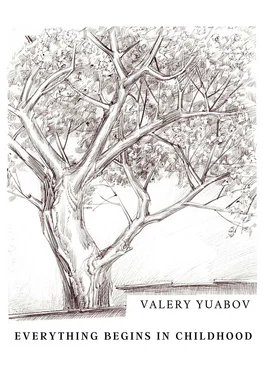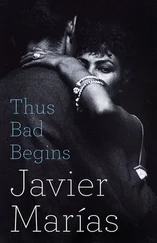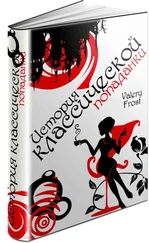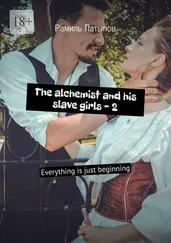Grandpa returned with knives and a jar of water. The wheels began turning merrily. A knife was jumping from grindstone to grindstone. Showers of sparks shot out from under the blade. Now and then, Grandpa cooled the blade in the water, then checked its sharpness on his nail. Grandpa Hanan rocked back and forth, back and forth, pressing the pedal. The pedal tapped gently – tap-tap-tap, tap-tap-tap . The grindstone produced its piercing tune – v-zh-zh-zh! v-zh-zh-zh! Emma and I joined in the concert, imitating the sound of drums, “Toom-ba-le-ka-toom! Toom-ba-le-ka-toom!” All that noise didn’t irritate Grandpa in the least. His tired face brightened up and he began singing something quietly.
Grandpa liked to sing when he was among friends, when no strangers were around. He sometimes sang something very sad. Perhaps he remembered the war in which he fought from the beginning almost to the end and lost many friends. When he returned home, he was sick. First, he had a bad case of bronchitis, then asthma. But he needed to feed his family. He who defended his homeland was given a medal and a small pension. He tried to earn extra money in different ways. He got himself mixed up in some shady business and ended up in jail. His son Avner and the son’s wife Sofia did their best to intercede on his behalf and succeeded in getting his sentence reduced. Grandpa spent two years in jail. When he was released, he had tuberculosis. He continued to do his best to earn a living and walked around town with the heavy sharpening machine.
Mama came out to the courtyard.
“Kids, we’ll be eating soon. We just need to buy bread.”
Bread, to be precise, lepyoshka (flat bread) was bought from an elderly Uzbek woman who lived nearby, across the street from the tea house. She baked them in the tandir (clay oven buried in the ground) under the awning. Small, plump, fragrant, with a crunchy crust, they were popular all over the neighborhood.
“ Bir sum (fifty kopecks),” the Uzbek woman took fifty kopecks and gave Mama five flat breads that were still exhaling the heat of the oven.
Oh, how we wanted to eat them right away or to have at least a little tiny piece, but Mama shook her head.
“At home, at home, with dinner.”
At home, at the table, Grandpa sang the prayer. “Amen” we echoed, as always. Pilaf was served on a big platter. Dark rice with chunks of meat appeared almost to breathe, exuding steam. Heads of garlic stood out in all their splendor on top of the hill of rice. The adults traditionally ate without spoons. They pressed a small portion of rice with their fingers into the platter and then raised it to their mouths. Grandma served raisins and thinly sliced carrots for dessert.
Unhurried dinner conversation was underway.
“How’s your health, Papa?” Mama asked.
Grandpa only nodded in response. He didn’t like such questions.
“How’s Amnun doing?” Grandma asked.
“I lost my health in combat, and he – on a motorcycle…,” Grandpa meant the incident with which it all began. “Ah, young people, young people.”
“Sugar, and I want butter! Sugar, and I want butter!” was heard from the hallway.
Those words were accompanied by ringing laughter and the snapping of fingers… My aunts, Rosa and Rena, who never missed a chance to tease me, had arrived. I always sang those words, “Sugar, and I want butter!” when I was hungry. After kissing us, Rosa and Rena sat down at the table.
“Have you been to the bazaar?”
“Yes. Everything is more expensive again,” Rosa informed us. “ Khurmati doozt (officials are thieves)! They don’t care about people.”
“How are things at the factory, Rosa?” asked Mama.
“They’ve raised the production quota once again. It was high enough to keep up with.”
“I know, I know. Meetings all the time. ‘Sew better, sew more.’ But our rate of pay is the same. It looks like they plan to raise the income tax beginning in May.”
“It’s the same with us – meetings to discuss output and alcoholism. I’m sick and tired of it. I have no more patience.”
“You’d better put up with it because there’s nowhere else to go. It’s the same everywhere,” Mama sighed.
Mama had three sisters and her brother Avner. They were good friends as they were growing up. When Grandpa was sent to the front, Mama was three and Avner was six. Grandma Abigai replaced her husband at his booth, working as a cobbler. Avner, as the eldest child, kept house – he frequented stores and the bazaar in search of food, took care of his sisters and even helped his mother in the booth, where he shined clients’ footwear. Mama told me that once he got hold of two rolls. On the way home, he was thirsty and stopped at a drinking fountain. He put the rolls down, had some water, and then saw that the rolls were gone.
“Valera, Valera!” Grandma Abigai sing-sang my name tenderly. “Oh, djoni bibesh. Ina gri (my dear, take this),” and she gave me a fat juicy piece of meat.
There was no limit to Grandma’s kindness. She always had a gift for her grandchildren in her modest house – be it a homemade toy or some sweets. And she always gave us her smiles.
It seemed to people who knew her that she was a very happy person. But I sometimes saw her and Mama crying together in the back of the house. They were very close, and when they got together, they talked without noticing the time.
“ Burma ,” Grandma winced as she tried a sour plum.
We often laughed when Grandma happened to put something sour in her mouth. She winced in a very funny way, her thick eyebrows came together over the bridge of her nose, her nostrils widened, but her eyes, on the contrary, became narrow slits, and her lips contorted as if she was about to cry. Even the scarf on her head seemed to wince.
Meanwhile, Rosa teased and tickled me.
“May I eat your eyes? How about your eyelashes?”
Seated next to me, she patted my cheeks and kissed my eyelids. My aunts liked my big eyes and long lashes. It seemed to me that they sometimes played with me as if I were a doll, and I got angry and embarrassed.
“Will you ever talk to us? I know what we’ll do to you. We’ll dye your lashes with usma .”
At that point I naturally couldn’t take it any longer. I broke free of Rosa’s arms and ran away.
* * *
Dying eyebrows was one of the favorite occupations of the women in our house.
They rubbed fresh usma sprouts between their palms and squeezed the juice out onto the bottom of a tea bowl turned upside down. Then they applied it to their eyebrows using cotton wool wrapped around a matchstick. Admiring their thick green eyebrows in a hand-held mirror, they repeated over and over, “How does it look?”
When the sisters had a free minute, they would turn on the radio to listen to Uzbek music. It was tender, slow, sad, and it was the only music they truly enjoyed, that touched their souls. The sisters would snap their fingers and rock in time with the music. They would also sing along to the songs they knew.
And Grandma liked to play cards, especially with her children and grandchildren, so she suggested her favorite entertainment. Her eyesight was poor, so she held the cards close to her eyes, squinting at each of them. She clicked her tongue, smiled, rocked from side to side and mumbled, “ Ibi basardroya. I na bin. (Damn it. Just look at this.)” She cast cunning glances at us, as if to say, “Oh my, I think I’m in trouble.”
But if someone tried to take advantage of her poor eyesight, it didn’t work. Grandma kept close track, with her watchful eye, of which cards other players put on the table, and if she noticed cheating, she returned the cards to the violators. Grandma was always vigilant.
Читать дальше












